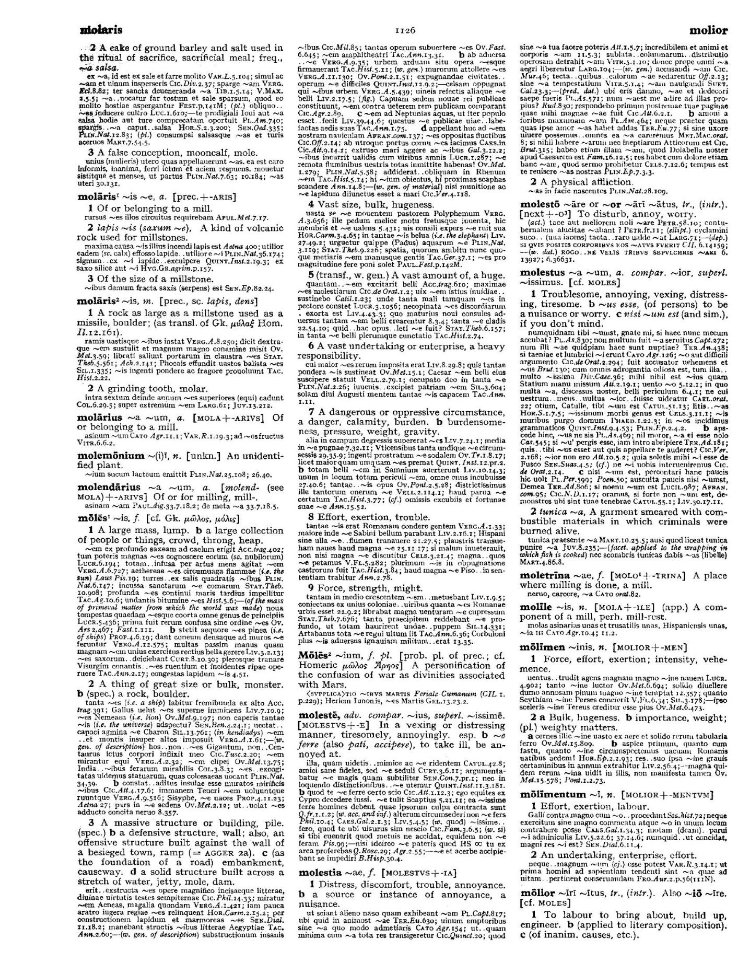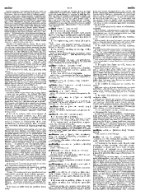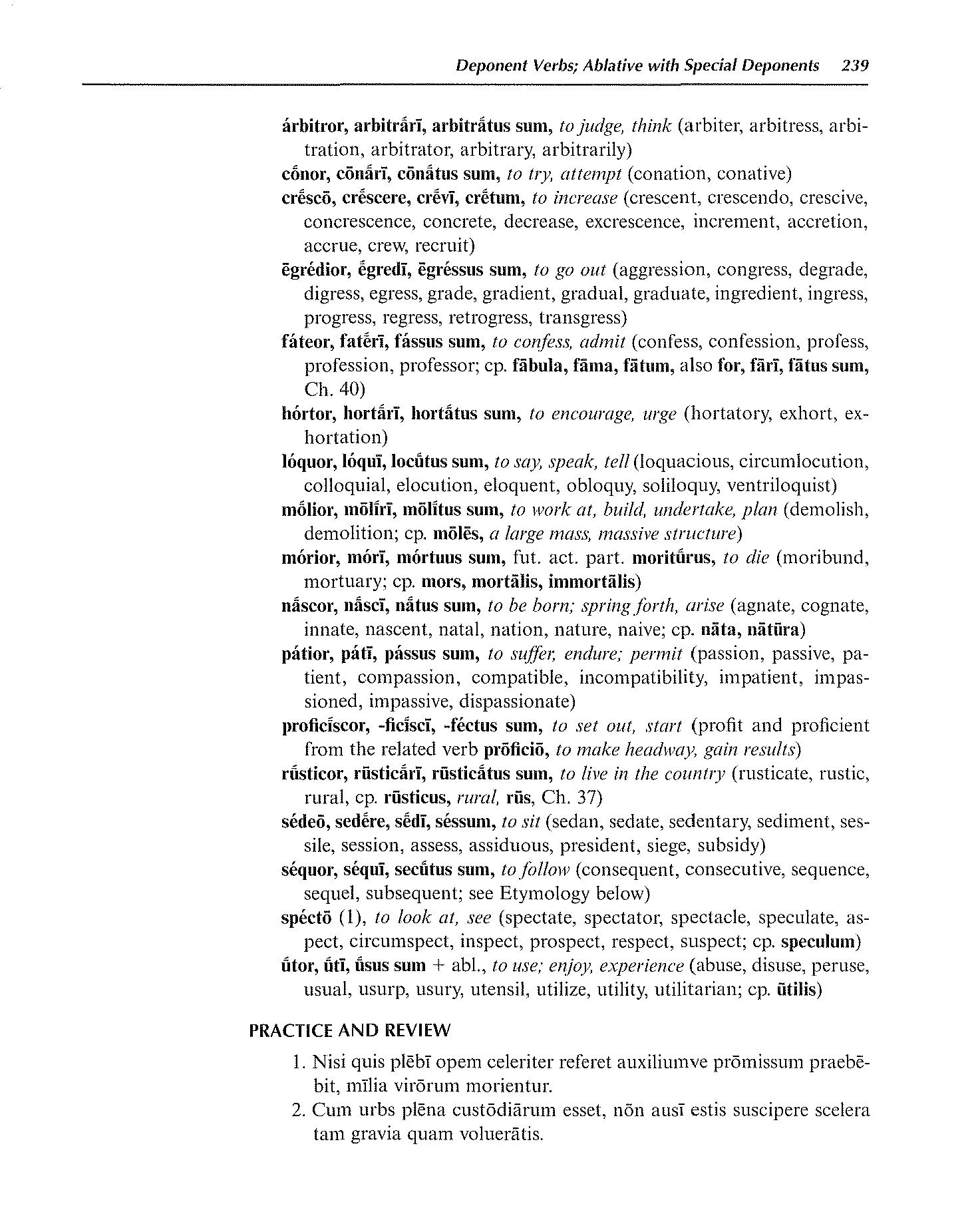
page_listing.tpl
page_subListingDetails.tpl
sub_listingDetails_style1.tpl
sub_listingDetails.title.tpl
mōlīrī to build
mōlīrī is a Latin Verb that primarily means to build.
Definitions for mōlīrī
Wheelock's Latin
Verb
- 1
to work at, build, undertake, plan
English derivatives:
demolish demolition
Oxford Latin Dictionary
Verb
- 1
To labour to bring about, build up, engineer. (b) (applied to literary composition). (c) (of inanim. causes, etc.).
- 2
(intr.) To make efforts, strive. (b) (w. inf.).
- 3
To labour at (a task, etc.), perform with effort.
- 4
To build, construct (usu. bulky structures or ones involving considerable effort). (b) (non-material things).
- 5
To set in motion (with some degree of effort): (a) to proel (missiles, etc.). (b) to get (a ship) under way; to set (a vehicle) moving; to stir (bodies of men) into movement. (c) to wield (a weapon or instrument). (d) to shift (a stationary or inert object); also, to shake, stir. (e) to shift, disturb (in digging, ploughing, etc.).
Sentences with mōlīrī
Latin to English
Eum sequere et haec mōlīre.Compare Follow him and work at these things.
Noster, qui remaneo, caedes molior.Compare He planned the slaughter of us who had remained.
Conjugation table for mōlīrī
Cactus2000
| ACTIVE | |
| Indicative present | Indicative imperfect |
| mōlior mōlīris mōlītur mōlīmur mōlīminī mōliuntur | mōliēbar mōliēbāris mōliēbātur mōliēbāmur mōliēbāminī mōliēbantur |
| Indicative perfect | Indicative pluperfect |
| mōlītus sum mōlītus es mōlītus est mōlītī sumus mōlītī estis mōlītī sunt | mōlītus eram mōlītus erās mōlītus erat mōlītī erāmus mōlītī erātis mōlītī erant |
| Indicative future | Indicative future perfect |
| mōliar mōliēris mōliētur mōliēmur mōliēminī mōlientur | mōlītus erō mōlītus eris mōlītus erit mōlītī erimus mōlītī eritis mōlītī erunt |
| Subjunctive present | Subjunctive imperfect |
| mōliar mōliāris mōliātur mōliāmur mōliāminī mōliantur | mōlīrer mōlīrēris mōlīrētur mōlīrēmur mōlīrēminī mōlīrentur |
| Subjunctive perfect | Subjunctive pluperfect |
| mōlītus sim mōlītus sīs mōlītus sit mōlītī sīmus mōlītī sītis mōlītī sint | mōlītus essem mōlītus essēs mōlītus esset mōlītī essēmus mōlītī essētis mōlītī essent |
Infinitive present mōlīrī Infinitive perfect mōlītum esse Infinitive future mōlītūrum esse | Imperative present mōlīre mōlīminī Imperative future mōlīto / mōlītor mōlīto / mōlītor - mōliunto / mōliuntor |
| PARTICIPLE | ||
| Participle present active | ||
| mōliēns | mōlientēs | |
| mōliēns | mōlientēs | |
| mōliēns | mōlientēs | |
| mōliēns | mōlientēs | |
| mōliēns | mōlientēs | |
| Participle future active | ||
| mōlītūrus | mōlītūrī | |
| mōlītūrus | mōlītūrī | |
| mōlītūrus | mōlītūrī | |
| mōlītūrus | mōlītūrī | |
| mōlītūrus | mōlītūrī | |
| Participle perfect passive | ||
| mōlītus | mōlītī | |
| mōlītus | mōlītī | |
| mōlītus | mōlītī | |
| mōlītus | mōlītī | |
| mōlītus | mōlītī | |
| Gerundive | ||
| mōliendus | mōliendī | |
| mōliendus | mōliendī | |
| mōliendus | mōliendī | |
| mōliendus | mōliendī | |
| mōliendus | mōliendī | |
| Gerund | Supine | |
| mōlīrī | mōlītum | |
| mōlīrī | mōlītū | |
| mōlīrī | ||
| mōlīrī | ||
| mōlīrī | ||
| PARTICIPLE | ||
| Participle present active | ||
| Nom. | mōliēns | mōlientēs |
| Gen. | mōlientis | mōlientium |
| Dat. | mōlientī | mōlientibus |
| Acc. | mōlientem | mōlientēs |
| Abl. | mōliente | mōlientibus |
| Participle future active | ||
| Nom. | mōlītūrus | mōlītūrī |
| Gen. | mōlītūrī | mōlītūrōrum |
| Dat. | mōlītūrō | mōlītūrīs |
| Acc. | mōlītūrum | mōlītūrōs |
| Abl. | mōlītūrō | mōlītūrīs |
| Participle perfect passive | ||
| Nom. | mōlītus | mōlītī |
| Gen. | mōlītī | mōlītōrum |
| Dat. | mōlītō | mōlītīs |
| Acc. | mōlītum | mōlītōs |
| Abl. | mōlītō | mōlītīs |
| Gerundive | ||
| Nom. | mōliendus | mōliendī |
| Gen. | mōliendī | mōliendōrum |
| Dat. | mōliendō | mōliendīs |
| Acc. | mōliendum | mōliendōs |
| Abl. | mōliendō | mōliendīs |
| Gerund | Supine | |
| Nom. | mōlīrī | mōlītum |
| Gen. | mōliendī | mōlītū |
| Dat. | mōliendō | |
| Acc. | mōliendum | |
| Abl. | mōliendō | |
Data sources
Notes
- Definitions
- Frederick M. Wheelock, Wheelock's Latin, 6th ed., rev. Richard A. LaFleur (New York, NY: HarperCollins Publishers, 2005): 239.
- P. G. W. Glare, Oxford Latin Dictionary, Vols. 1-8 (Oxford: Clarendon Press, 1982): 1126.
- Word frequencies
- Paul B. Diederich, The Frequency of Latin Words and Their Endings, PhD diss., (Columbia University, 1939).
Bibliography
Allen, Joseph H. Allen and Greenough's New Latin Grammar for Schools and Colleges: Founded on Comparative Grammar. Edited by James B. Greenough, George L. Kittredge, Albert A. Howard, and Benjamin L. D'Ooge. Boston, MA: Ginn & Company, 1903.
Crystal, David. A Dictionary of Linguistics and Phonetics. 6th ed. Oxford, UK: Blackwell Publishing, 2008.
Delatte, Louis, Suzanne Govaerts, Joseph Denooz, and Etienne Evrard. Dictionnaire fréquentiel et index inverse de la langue latine [Frequency Dictionary and Inverse Index of the Latin Language]. Liège, Belgium: Laboratoire d'analyse statistique des langues anciennes de l'Université de Liège (L.A.S.L.A.), 1981.
Diederich, Paul B. The Frequency of Latin Words and Their Endings. PhD diss., Columbia University, 1939.
Francese, Christopher. "Latin Core Vocabulary." Dickinson College Commentaries. Last modified 2014. http://dcc.dickinson.edu/latin-vocabulary-list.
Gildersleeve, Basil L., and Gonzales Lodge. Gildersleeve's Latin Grammar: Third Edition, Revised, and Enlarged. 3rd ed. London, England: Macmillan and Co., 1903.
Glare, Peter G.W. Oxford Latin Dictionary. Vols. 1-8. Oxford, England: Clarendon Press, 1982.
Krüger, Bernd. "Latin Conjugation Tables." Cactus2000. Accessed May 5, 2023. https://latin.cactus2000.de/index.en.php.
Pierson, Nick. "Sound of Text." Accessed October 26, 2019. https://soundoftext.com.
Wheelock, Frederick M. Wheelock's Latin. 6th ed. Revised by Richard A. LaFleur. New York, NY: HarperCollins Publishers, 2005.
Wiktionary Contributors. "Victionarium." Wikimedia Foundation, Inc. Updated March 18, 2019. https://la.wiktionary.org/wiki/Victionarium:Pagina_prima.
Citation
Chicago (17th ed.)
Allo Contributors. "mōlior, mōlīrī, mōlītus sum (v.) - Latin Word Definition." Allo Latin Dictionary. Last modified . Accessed February 19, 2026. http://ancientlanguages.org/latin/dictionary/molior-moliri-molitus-sum.
Entry created on . Last updated on .








